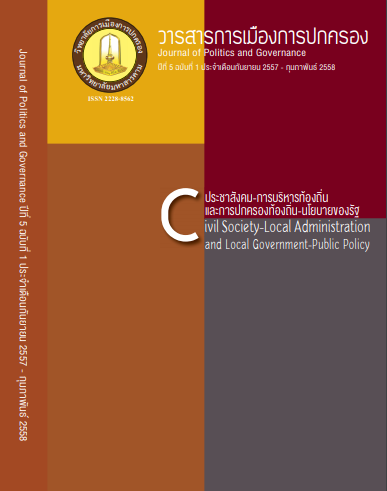Introducing Organic Food to Private Primary Schools in Bangkok
Main Article Content
Abstract
The global food provision and consumption has been changed into more sustainable direction. The general patterns of change include an increasing consumer demand for safe and healthy food which is produced in an environmentally friendly way. The objectives of this study are to investigate current situation of primary school lunch and to evaluate feasibility in having organic lunch in school. Qualitative and quantitative research methodology was applied to study school and parents of primary school students. The study found that both providers (schools) and consumers (parents) are willing to change to more sustainable food. For providers, the school executives believe that changing to organic food will bring about better consequences to health and the environment. However, they are concerned about lack of organic food in terms of variety and quantity. For consumers, the parents have purchasing power and likely to accept organic food for their children. However, the parents need to receive more information about organic food and price difference. This study suggests two recommendations to introduce organic food to school. Firstly, the school must contract organic food suppliers near Bangkok to supply organic food to school once a week and use organic food to cook for student at least 2 days a week. Secondly, the school executives must set up farm visit activities with local supplier. Parents and students should visit the farm to learn about how foods are produced. Many counties worldwide supply local organic food to school and succeed in more sustainable food transition in school setting.
Article Details

This work is licensed under a Creative Commons Attribution-NonCommercial-NoDerivatives 4.0 International License.
References
กรมวิชาการเกษตร(2553). การรับรองมาตรฐานการผลิตพืชอินทรีย์. Retrieved 1 กันยายน, 2557, from http://gmis.doa.go.th/~organic/form/report_3_no_session.php
Bangkok Metropolitan Administration. (2005). Bangkok Administration Retrieved 19 June 2009 http://203.155.220.118/info/sucgess/answers.asp.
Beck, U., & Willms, J. (2004). Conversations with Ulrich Beck: Polity.
Bocchi, S., Spigarolo, R., Sarti, V., & Nölting, B. (2009). Organising supply chains of organic products for Italian school meals-The case of the province and of the city of Piacenza. Paper presented at the Providing organic school food for youths in Europe. Proceedings of the iPOPY seminar held at the BioFach February 20th.
Chouichom, S., Liao, L. M., & Yamao, M. (2013). General View Point, Perception and Acceptance of Organic Food Products Among Urban Consumers in the Thai Marketplace. Sustainable Food Security in the Era of Local and Global Environmental. Change (pp. 187-201): Springer.
FAO IFAD WFP. (2013). The State of Food Insecurity in the World: the dimension of food security. Rome: FAO.
Giddens, A. (1984). The constitution of society: Outline of the theory of structuration: University of California press.
Giddens, A. (1990). The consequences of modernity: Polity Press.
Gidlöf, L., & Retta Belay, H. (2011). Habits related to television, computer games and eating among school children in a rural and an urban area of Thailand. Uppsala University.
Kantamaturapoj, K. (2012). Sustainable food consumption in urban Thailand: an emerging market? : Wageningen University.
Løes, A.-K., & Nölting, B. (2009). Organic school meal systems–towards a more sustainable nutrition. Agronomy Research, 7(Special issue II), 647-653.
O’Doherty, J., Larsen, K., Molgaard, H. N., Andersen, J., Tingstad, A., Marckmann, P., O. F. a. h. h. P. o. t. E. (2001). Organic Foods and human health: Proceedings of the European Conference. Paper presented at the Organic food and farming towards partnership and action in Europe, Copenhagen.
Office of the Private Education Commission. (2009). Private School Statistic. Retrieved 2 October, 2012, from http://www.opec.go.th/sthiti-rongreiyn-xekchn
Oosterveer, P. (2005). Global food governance: Wageningen Universiteit.
Rittem, M. (2014). Situation of Pesticide Contamination in the Environment. Paper presented at the the 3rd Pesticide Alert Network Conference, Bangkok.
Spaargaren, G. (2003). Sustainable consumption: a theoretical and environmental policy perspective. Society & Natural Resources, 16(8), 687-701.
Stern, P. (2000). New environmental theories: toward a coherent theory of environmentally significant behavior. Journal of social issues, 56(3), 407-424.
Vallianatos, M., Gottlieb, R., & Haase, M. A. (2004). Farm-to-School strategies for urban health, combating sprawl, and establishing a community food systems approach. Journal of Planning Education and Research, 23(4), 414-423.


